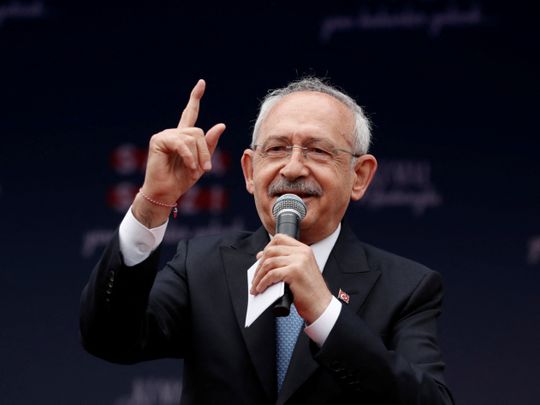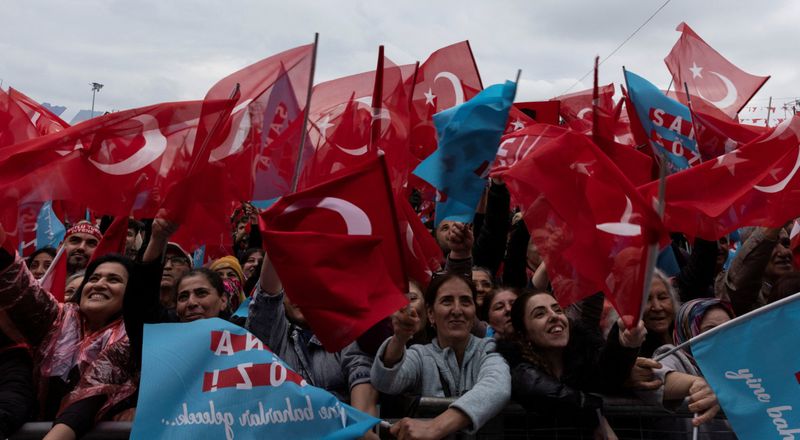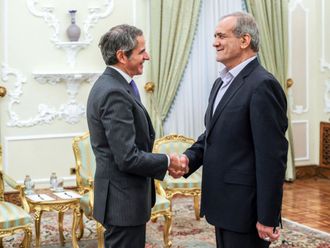
ISTANBUL: Stuck in Recep Tayyip Erdogan’s shadow throughout his career, Turkish opposition leader Kemal Kilicdaroglu believes his time may have come after suffering repeated election defeats from the man who has dominated politics for two decades.
An opposition alliance has named Kilicdaroglu, chairman of the Republican People’s Party (CHP), its candidate to take on President Erdogan in May 14 elections.
His prospects may have been boosted by a last minute deal to reunite an opposition bloc that had splintered over whether he should be the candidate.
After a political drama, the six parties agreed that the popular mayors of Istanbul and Ankara would serve as his vice presidents should he overcome Erdogan.
Kilicdaroglu would also be capitalising on the opposition’s 2019 triumph when the CHP defeated Erdogan’s ruling AK Party (AKP) in Istanbul and other big cities in local elections, thanks to support from other opposition parties.
“We will rule Turkey with consultations and compromise,” Kilicdaroglu told several thousand supporters cheering outside the headquarters of the Felicity Party, one of the six in the opposition bloc.
“We will establish the rule of morality and justice together,” he said.
Kilicdaroglu’s detractors say he lacks Erdogan’s power to rally and capture audiences, and has no clear or convincing vision for what a post-Erdogan era looks like.
His backers underscore his reputation as an ethical bureaucrat, said Gonul Tol, head of the Turkey programme at Washington-based think-tank Middle East Institute said.
“He is not a corrupt man. He doesn’t steal,” she said.
“He wants to conclude his political career as the person who has resuscitated the Turkish democracy, that’s why he is the right man.”
Polls suggest a tight presidential and parliamentary vote, which will decide not just who leads Turkey but how it is governed, where its economy is headed and what role it may play to ease conflict in Ukraine and the Middle East.
Yet many wonder whether the earnest and sometimes feisty former civil servant can defeat Erdogan, the country’s longest-serving leader, whose campaigning charisma has helped deliver more than a dozen election victories over two decades.

ENTRY INTO POLITICS
Erdogan’s unorthodox economic policies, including interest rate cuts when inflation soared above 85% last year, have strained households and sparked a series of currency crashes since 2018.
The hardship presents a historic opening for Kilicdaroglu, a former economist, to end Erdogan’s reign that began when AKP first came to power in 2002.
In that election, he entered parliament for the centre-left CHP, a party established by modern Turkey’s founder Mustafa Kemal Ataturk which has struggled to reach beyond its secularist grassroots towards move conservative Turks.
He has spoken in recent years of a desire to heal old wounds with devout Muslims and Kurds, including groups in Diyarbakir that he met and acknowledged that CHP had upset in the past.
But Kilicdaroglu has struggled to maintain momentum. Recent polling showed Erdogan’s support had edged up since last summer thanks to measures including a raise in the minimum wage.
RISE THROUGH THE RANKS
Kilicdaroglu rose to prominence as the CHP’s anti-graft campaigner, appearing on TV to brandish dossiers against officials which led to high-profile resignations. In 2009 he lost an election as the CHP’s Istanbul mayoral candidate.
The following year, he was elected unopposed as CHP leader after his predecessor’s resignation in the wake of scandal.
'GANDHI KEMAL'
Before entering politics, Kilicdaroglu, 74, worked in the finance ministry and then chaired Turkey’s Social Insurance Institution for most of the 1990s. In speeches, Erdogan frequently disparages his performance in that role.
Born in the eastern Tunceli province, he is a civil servant’s son and an Alevi, a group which makes up 15-20% of Turkey’s 85 million population and which follows a faith drawing on Shi’ite Muslim, Sufi and Anatolian folk traditions.
Kilicdaroglu has acknowledged being Alevi but generally avoids the issue. Alevis’ beliefs put them at odds with the country’s Sunni Muslim majority.
Nicknamed by the Turkish media as “Gandhi Kemal” because of a passing resemblance with his slight, bespectacled appearance, he captured the public imagination in 2017 when he launched his 450 km “March for Justice” from Ankara to Istanbul over the arrest of a CHP deputy.











